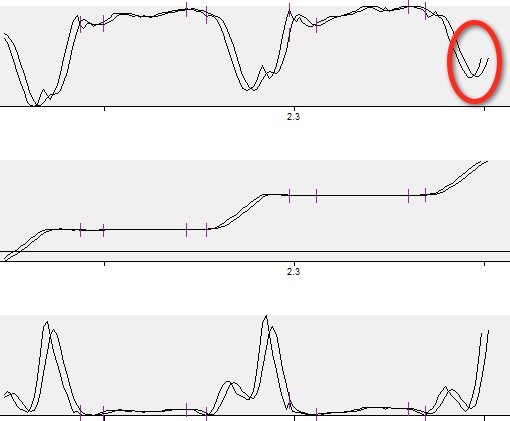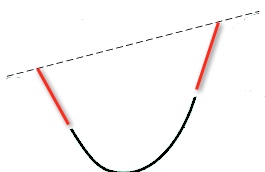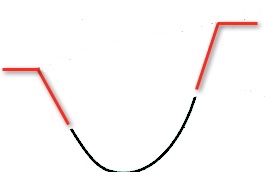Onepass Filter
| Language: | English • français • italiano • português • español |
|---|
Filter a signal with a one-pass filter. This type of filter will introduce a delay in the resulting signal, but is often used for EMG signals because the latency reflects the elctro-mechanical delay.
This filter may also be used for impact situations, such as hitting a stationary ball.

Pipeline Command
- Onepass_Filter
- ! /SIGNAL_TYPES=
- ! /SIGNAL_FOLDER=ORIGINAL
- ! /SIGNAL_NAMES=
- ! /SIGNAL_COMPONENTS=
- ! /RESULT_FOLDER=PROCESSED
- ! /EVENT_SEQUENCE=
- ! /EXCLUDE_EVENTS=
- ! /CUTOFF_FREQUENCY=6
- ! /NUM_REFLECTED_FRAMES=0
- ! /NUM_EXTRAPOLATED_FRAMES=0
- ! /NUM_BUFFERED_FRAMES=0
- ! /FILTER_CLASS=BUTTERWORTH
- ! /ADD_EXTRA_FRAMES=FALSE
- ;
FILTER_CLASS can be BUTTERWORTH or CRITICALLY_DAMPED
Num_Reflected_Frames
Filters are not particularly effective near the ends of the signal, so it is often useful to add an artificial buffer.
Frames can be reflected about the endpoints.
Num_Extrapolate_Frames
Num_Buffered_Frames
The signal can be buffered beyond the reflection or extrapolation.
Add_Extra_Frames
 The one pass filter adds a delay to the signals and truncates the end of the signal.
The one pass filter adds a delay to the signals and truncates the end of the signal.
 A Onepass filter is often used as an attempt to preserve an impact condition (or sudden discontinuity in the signal). An example might be a golf club immediately before impact. In an attempt to estimate the velocity of the club immediately impact two more frames of artificial data can be added by extrapolating the signal beyond the point of impact. see the circles in the above figures.
A Onepass filter is often used as an attempt to preserve an impact condition (or sudden discontinuity in the signal). An example might be a golf club immediately before impact. In an attempt to estimate the velocity of the club immediately impact two more frames of artificial data can be added by extrapolating the signal beyond the point of impact. see the circles in the above figures.
Command Dialog
Legacy Command Name
- Butterworth_Filter_Onepass
- ! /SIGNAL_TYPES=
- ! /SIGNAL_NAMES=
- ! /SIGNAL_FOLDER=ORIGINAL
- ! /SIGNAL_COMPONENTS=
- ! /RESULT_FOLDER=PROCESSED
- ! /EVENT_SEQUENCE=
- ! /EXCLUDE_EVENTS=
- ! /CUTOFF_FREQUENCY=6
- ! /NUM_REFLECTED_FRAMES=0
- ! /NUM_BUFFERED_FRAMES=0
- ;




